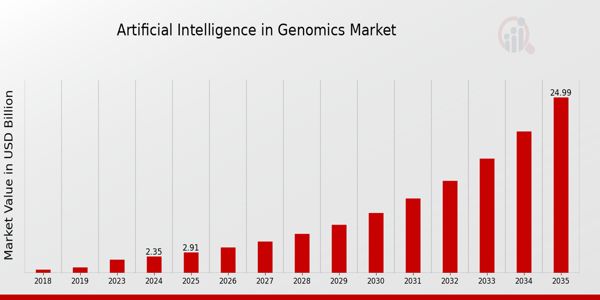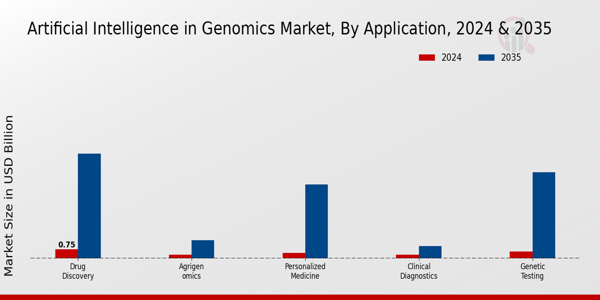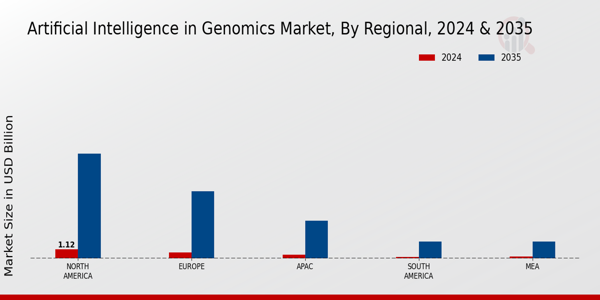Global Artificial Intelligence in Genomics Market Summary
As per MRFR analysis, the artificial intelligence in genomics market size was estimated at 2.35 (USD billion) in 2024 and is expected to grow to 25 (USD billion) by 2035 at a CAGR (growth rate) of around 23.98% during the forecast period (2025-2035).
Key Market Trends and Highlights
In the Artificial Intelligence in Genomics Market, North America holds the largest market share valued at 0.94 USD Billion in 2024.
- The artificial intelligence in genomics market in Europe is expected to be valued at 8.05 USD Billion by 2035
- The personalized medicine segment was valued at 0.5 USD billion in the artificial intelligence in genomics market in 2024.
- The market value for drug discovery is projected to reach 8.0 USD billion by 2035.
- Advancements in genomics research and development of precision medicine will mostly enhance scope for AI in genomics.
Major Players
Key artificial intelligence in genomics market players include Thermo Fisher Scientific, iCarbonX, Grail, and other players. Players incorporate artificial intelligence to enhance data interpretation, improve accuracy in genomic sequencing, and streamline workflows in genomic laboratories.
Market Size, Forecast and Growth Rate
2024 Market Size: USD 2.35 Billion
2035 Market Size: USD 25 Billion
CAGR 2025 to 2035: 23.98%
Largest Regional Market Share in 2024: North America
Key Artificial Intelligence in Genomics Market Trends Highlighted
The Artificial Intelligence in Genomics Market is experiencing significant growth driven by several key market drivers. Increased investment in research and development, particularly in the life sciences sector, has fueled the integration of AI technologies into genomic analyses. This is largely due to the growing demand for personalized medicine, which aims to tailor treatment plans based on individual genetic profiles. As healthcare systems shift towards precision medicine, AI is playing a vital role in processing large amounts of genomic data, thereby enhancing diagnostic accuracy and treatment efficacy.
The potential for exploration in this market is extensive, especially regarding partnerships between technology companies and healthcare organizations. By harnessing shared knowledge, these collaborations can expedite advancements in AI algorithms tailored for genomic analysis. Furthermore, governments worldwide are acknowledging the significance of genomics in public health and are channeling resources into infrastructure to support genomic research. These initiatives can open new pathways for AI applications in genomics, particularly in areas like disease prevention and population health management.
Recently, trends in the global market indicate a significant uptick in the adoption of machine learning algorithms and natural language processing tools in genomics research and clinical applications. Research institutions and healthcare providers are increasingly utilizing these advanced technologies to streamline genomic data interpretation and improve patient outcomes. The rising pressure to reduce healthcare costs while enhancing quality of care is also propelling the demand for efficient AI solutions in genomics.
Overall, the synergy between AI advancements and genomics is paving the way for transformative changes in healthcare and research on a global scale, hinting at a promising future for this market.

Source: Primary Research, Secondary Research, Market Research Future Database and Analyst Review
Artificial Intelligence in Genomics Market Drivers
Increasing Demand for Precision Medicine
The Artificial Intelligence in Genomics Market is experiencing significant growth driven by the rising demand for precision medicine. Precision medicine tailors treatment to individuals based on their genetic makeup, which is particularly crucial in oncology. The National Cancer Institute highlights that cancer cases are expected to rise to 23.6 million by 2030, an increase from 18.1 million in 2018. Organizations like GRAIL and Foundation Medicine are leveraging Artificial Intelligence and genomic sequencing to develop targeted therapies, improving success rates in cancer treatment.
Governments around the globe are now investing in genomics initiatives, with the U.S. National Institutes of Health launching the All of Us Research Program, aimed at advancing the use of genomic data for personalized healthcare solutions. This increasing focus on precision medicine is a key driver of growth in the Artificial Intelligence in Genomics Market.
Advancements in Genomic Research and Technology
The continuous advancements in genomic research and technology underpin the growth of the Artificial Intelligence in Genomics Market. The decreasing cost of genomic sequencing, which has fallen from approximately $100,000 in the early 2000s to less than $1,000 today, enables wider adoption among healthcare providers and researchers. This trend is supported by organizations like Illumina, which leads the market with innovative sequencing platforms.
The development of technologies such as CRISPR and next-generation sequencing fosters a greater understanding of the human genome. The World Economic Forum recently reported that genomic data is projected to double every seven months, emphasizing the need for sophisticated AI tools to analyze this volume of data effectively. This dynamic environment contributes significantly to the market's growth trajectory.
Rising Incidence of Genetic Disorders
The increasing incidence of genetic disorders is a significant driver for the Artificial Intelligence in Genomics Market. According to the World Health Organization, genetic disorders contribute to nearly 30% of deaths among children under the age of five, which highlights the urgent need for effective diagnostic and therapeutic solutions. Organizations like Genomics England and the European Society of Human Genetics are actively engaged in research and innovation aimed at identifying and treating genetic conditions.
By utilizing artificial intelligence, researchers can analyze genomic data to pinpoint mutations and predispositions to genetic disorders more efficiently. The elevated need for effective health solutions in this area propels demand for AI technologies in genomics, thus driving market growth.
Artificial Intelligence in Genomics Market Segment Insights
Artificial Intelligence in Genomics Market Application Insights
The Artificial Intelligence in Genomics Market by application encompasses areas such as drug discovery, genetic testing, personalized medicine, agrigenomics, and clinical diagnostics. Drug discovery is anticipated to hold a majority share, valued at 0.75 USD billion in 2024, and growing to 8.0 USD billion by 2035. It is vital for the pharmaceutical industry as it integrates AI technologies to streamline the drug development process, thus enhancing efficiency and reducing time-to-market for new therapies.
Genetic testing also represents a notable area in the market, expected to grow from 0.45 USD billion in 2024 to 5.0 USD billion in 2035. This application plays a significant role in identifying genetic disorders and informing treatment strategies, thereby driving demand for AI capabilities in genomics. Personalized medicine, with a valuation of 0.5 USD billion in 2024 and a forecasted increase to 6.0 USD billion by 2035, leverages AI for tailoring individualized treatments based on genetic makeup, making it a promising sub-segment that resonates with current trends towards customized healthcare solutions.
Agrigenomics is projected to grow from 0.3 USD billion in 2024 to 3.5 USD billion in 2035, emphasizing the application of genomics in agriculture to improve crop yield and resilience, which is increasingly critical given global food security challenges. Clinical diagnostics, valued at 0.35 USD billion in 2024 and expected to rise to 2.5 USD billion by 2035, facilitates faster and more accurate analysis of genetic information, thereby supporting enhanced patient care.

Source: Primary Research, Secondary Research, Market Research Future Database and Analyst Review
Artificial Intelligence in Genomics Market Technology Insights
By technology, the Artificial Intelligence in Genomics Market is experiencing significant growth, driven by the increasing demand for advanced data analysis in genomics. Machine learning and deep learning are critical components, as they enable the analysis of complex biological data, leading to improved diagnostics and personalized medicine.
Natural language processing plays a vital role in interpreting vast amounts of unstructured genomic data, facilitating better decision-making in research and clinical settings. Reinforcement learning is significant for optimizing genomic processes, such as drug discovery and clinical trial design. Computer vision is increasingly important, allowing researchers to analyze genomic images and structure variations with greater accuracy.
These technologies are not only enhancing the efficiency of genomic studies but also driving innovations in healthcare, making the Artificial Intelligence in Genomics Market a focal point for growth and development in the coming years. The market growth is supported by advancements in research, rising investments, and a strong emphasis on data-driven decision-making in the health sector.
Artificial Intelligence in Genomics Market End User Insights
The Artificial Intelligence in Genomics Market by end user includes different entities including pharmaceutical companies, research institutes, healthcare providers, and biotechnology companies. Pharmaceutical companies are particularly significant, leveraging AI for drug discovery and personalized medicine, thus streamlining Research and Development processes.
Research institutes are also playing a crucial role, engaging in cutting-edge genetic studies that enhance the understanding of genetic disorders. Healthcare providers are adopting AI solutions to improve patient outcomes by offering tailored treatments based on genomic insights. Biotechnology companies dominate the market due to their innovative approaches in using AI for genetic engineering and synthetic biology, which pave the way for novel therapeutic solutions.
The prevailing trend shows strong market expansion, driven by heightened investment in genomic research and innovations in AI technologies. Addressing challenges like data privacy and ethical concerns is crucial, yet there are numerous opportunities through collaborative R&D initiatives and developing regulatory frameworks that foster innovation in this vital sector.
Artificial Intelligence in Genomics Market Deployment Mode Insights
The Artificial Intelligence in Genomics Market by deployment mode is categorized primarily into on-premises, cloud-based, and hybrid deployment modes. On-premises solutions are preferred by organizations requiring greater control and security over sensitive genomic data, thereby maintaining compliance with stringent regulations.
Cloud-based deployments are gaining traction due to their scalability and flexibility, enabling facilities to manage large datasets without heavy infrastructure investments. The hybrid model, which combines elements of both on-premises and cloud solutions, is becoming increasingly popular as it allows institutions to effectively balance cost, performance, and data security.
Artificial Intelligence in Genomics Market Regional Insights
North America leads this market with a valuation of 0.94 USD billion in 2024 and is expected to expand to 10.73 USD billion by 2035, showcasing its dominance due to strong investments in health technology and research facilities. Europe follows closely, starting at 0.7 USD billion in 2024 and reaching 8.05 USD billion by 2035, reflecting robust research initiatives and collaborations among government and industry stakeholders.
South America, valued at 0.15 USD billion in 2024, is anticipated to grow to 1.75 USD billion by 2035, albeit with slower adoption rates due to less funding in technology. In Asia Pacific, a valuation of 0.5 USD billion in 2024 is expected to rise to 4.45 USD billion by 2035, supported by increasing investment in biotechnology and healthcare sectors, indicating significant growth potential. The Middle East and Africa begin with a valuation of 0.06 USD billion in 2024 and may reach 0.92 USD billion in 2035.
This lower figure highlights the emerging market opportunities in AI-driven genomics which may be further enhanced by increased government support and global collaborations.

Source: Primary Research, Secondary Research, Market Research Future Database and Analyst Review
Artificial Intelligence in Genomics Market Key Players and Competitive Insights
The Artificial Intelligence in Genomics Market has garnered significant attention over recent years as innovations in AI technology enable new possibilities in genomic research and analysis. The competitive landscape is characterized by a diverse array of players ranging from established biotech firms to emerging tech companies. These entities are increasingly leveraging artificial intelligence to enhance data interpretation, improve accuracy in genomic sequencing, and streamline workflows in genomic laboratories.
Companies are differentiating themselves not only through technological innovation but also by forming strategic partnerships, engaging in mergers and acquisitions, and expanding their service offerings to meet the evolving needs of researchers and healthcare institutions. As the demand for personalized medicine and genomic data analysis grows, the competitive dynamics will continue to evolve with an emphasis on cutting-edge research and application.
Thermo Fisher Scientific is a leading player in the Artificial Intelligence in Genomics Market, known for its robust portfolio of genomic solutions and advanced technologies. The company has established a strong market presence by effectively integrating AI with its extensive tools for sequencing, genotyping, and molecular analysis. Thermo Fisher Scientific's strength lies in its ability to deliver comprehensive solutions that cater to various stages of the genomic research workflow, from sample preparation to data analysis.
By investing in research and development, the company has been able to enhance its capabilities in machine learning and data analytics, thus improving the accuracy and efficiency of genomic tests. Furthermore, its global reach and established relationships with research institutions and healthcare providers enable Thermo Fisher Scientific to maintain a steady market position and continue driving advancements in genomic AI applications.
iCarbonX is an important biotechnology company based in Shenzhen, known for its integration of artificial intelligence with genomic and multi-omics data to provide personalized health insights. Established in 2015 by former BGI CEO Jun Wang, the company’s premier platform, Meum, employs AI to assess genomic, proteomic, and behavioral data, providing customized health recommendations. The organization specializes in creating AI-driven tools for data mining, predictive modeling, and visualization, establishing itself as a significant contributor to precision health and digital genomics.
Supported by prominent investors and strategic partnerships, iCarbonX has broadened its international footprint through initiatives such as the Digital Life Alliance, working alongside organizations like SomaLogic and PatientsLikeMe. The acquisition of Israel-based Imagu Vision Technologies has further enhanced its AI and image-processing capabilities, solidifying its position as a leader in the evolving landscape of AI in genomics.
Key Companies in the Artificial Intelligence in Genomics Market Include
- Thermo Fisher Scientific
- iCarbonX
- Grail
- Microsoft
- IBM
- NVIDIA
- Illumina
- DNAnexus
- Deep Genomics
- Fabric Genomics
- PathAI
- Freenome
- Verily Life Sciences
- Sema4
- BenevolentAI
Artificial Intelligence in Genomics Market Developments
Recent advancements in the Artificial Intelligence in Genomics Market highlight remarkable progress and creativity. Organizations such as Thermo Fisher Scientific and Illumina are enhancing their AI-driven platforms to improve genomic sequencing and analysis, with Illumina utilizing DRAGEN for faster variant calling and data interpretation.
In July 2023, Illumina introduced the Alliance for Genomic Discovery, a collaborative initiative involving deCODE genetics (an Amgen subsidiary), AbbVie, AstraZeneca, Bayer, and Merck. This partnership aims to co-fund whole-genome sequencing of 250,000 diverse samples for the purpose of drug target discovery.
Microsoft has been enhancing its involvement in the biotech sector, particularly through a partnership with 1910 Genetics in June 2023 to implement Azure Quantum Elements for AI-driven drug discovery. Additionally, Amgen’s deCODE genetics started utilizing NVIDIA’s BioNeMo supercomputer in early 2024 to develop extensive genomic models (“Freyja”) aimed at biomarker and target discovery.
In recent years, there has been a surge of interest in AI-powered genomics, particularly following the launch of Grail's Galleri multi-cancer early-detection blood test in late 2022, which represents a significant advancement in AI-driven diagnostic applications.
Artificial Intelligence In Genomics Market Segmentation Insights
Artificial Intelligence in Genomics Market Application Outlook
- Drug Discovery
- Genetic Testing
- Personalized Medicine
- Agrigenomics
- Clinical Diagnostics
Artificial Intelligence in Genomics Market Technology Outlook
- Machine Learning
- Deep Learning
- Natural Language Processing
- Reinforcement Learning
- Computer Vision
Artificial Intelligence in Genomics Market End User Outlook
- Pharmaceutical Companies
- Research Institutes
- Healthcare Providers
- Biotechnology Companies
Artificial Intelligence in Genomics Market Deployment Mode Outlook
- On-Premises
- Cloud-Based
- Hybrid
Artificial Intelligence in Genomics Market Regional Outlook
- North America
- Europe
- South America
- Asia Pacific
- Middle East and Africa
|
Report Attribute/Metric
|
Details
|
|
Market Size 2023
|
1.89 (USD billion)
|
|
Market Size 2024
|
2.35 (USD billion)
|
|
Market Size 2035
|
25.0 (USD billion)
|
|
Compound Annual Growth Rate (CAGR)
|
23.98% (2025-2035)
|
|
Report Coverage
|
Revenue Forecast, Competitive Landscape, Growth Factors, and Trends
|
|
Base Year
|
2024
|
|
Market Forecast Period
|
2025-2035
|
|
Historical Data
|
2019-2024
|
|
Market Forecast Units
|
USD billion
|
|
Key Companies Profiled
|
Thermo Fisher Scientific, iCarbonX, Grail, Microsoft, IBM, NVIDIA, Agilent Technologies, Biogen, Amgen, Genentech, DNAnexus, BenevolentAI, Deep Genomics, Fabric Genomics, PathAI, Freenome, Verily Life Sciences, Sema4, Edgewise Therapeutics
|
|
Segments Covered
|
Application, Technology, End User, Deployment Mode, Regional
|
|
Key Market Opportunities
|
Personalized medicine advancements, Predictive analytics for disease prevention, Enhanced drug discovery processes, Genomic data management solutions, Integration with clinical workflows
|
|
Key Market Dynamics
|
Increased genomic data analysis, Rising demand for personalized medicine, Advancements in machine learning algorithms, Growing adoption of cloud computing, Collaborations between biotech companies
|
|
Countries Covered
|
North America, Europe, APAC, South America, MEA
|
Frequently Asked Questions (FAQ):
The Artificial Intelligence in Genomics Market was valued at 2.35 billion USD in 2024.
By 2035, the Artificial Intelligence in Genomics Market is anticipated to reach a valuation of 25.0 billion USD.
The market is projected to grow at a CAGR of 23.98% from 2025 to 2035.
In 2024, North America held the largest market share, valued at 0.94 billion USD.
The North America artificial intelligence in genomics market is projected to grow to 10.73 billion USD by 2035.
Drug discovery applications of artificial intelligence in genomics is expected to be valued at 8.0 billion USD by 2035.
Key players in the market include Thermo Fisher Scientific, Microsoft, and IBM, among others.
The genetic testing segment of the global artificial intelligence in genomics totaled 0.45 billion USD in 2024.
Clinical diagnostics applications of artificial intelligence in genomics are projected to reach a value of 2.5 billion USD by 2035.
The Asia Pacific artificial intelligence in genomics market is expected to reach 4.45 billion USD by 2035.

















